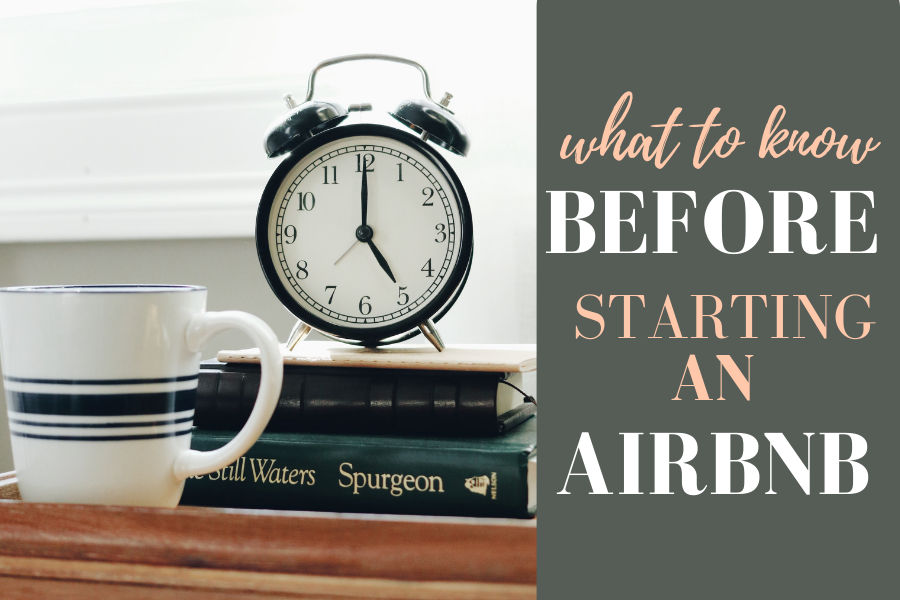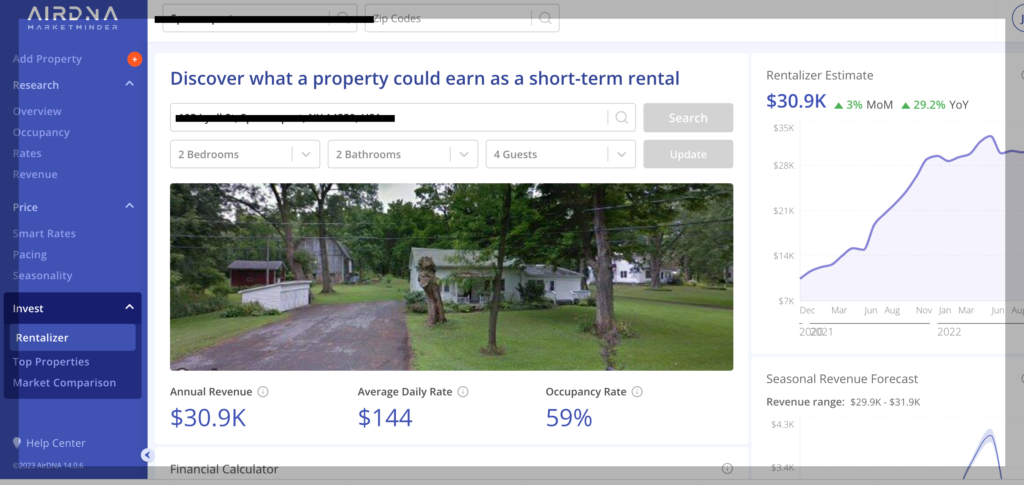If you’re dreaming about launching a short-term rental, there so much to think through. Here’s what to know before starting an Airbnb.

When thinking about getting into Airbnb hosting, you probably researching what to know before starting an Airbnb. Once you get started as an Airbnb host, you are going to discover so many things you will wish you knew sooner. There are so many lessons learned in the first year of hosting regardless of how much your prepare in advance.
As a host of over 4 year myself, I can tell you firsthand that you’ll make mistakes constantly. But the great news is that every mistake is a chance to learn something new about your business, and a chance to get better at what you do.
In this post, you’re going to get filled in on what to know before starting an Airbnb & 14 common mistakes or misconceptions people have about being an Airbnb host.
This post is all about what to know before starting an Airbnb.
What to Know Before Starting an Airbnb:
1. You’re Entering the World of the Hospitality Industry

Owning a short-term rental instantly puts you in the hospitality business. Guests who stay at your place will expect a level of comfortability, certain conveniences, and they may also expect you to be their personal guide to the area. Many get into the STR business because it’s lucrative, but lack the customer service skills needed to operate their STR successfully. If that’s you, don’t be afraid to hire a co-host to help you.
2. You’ll Need to Understand Your Local Regulations
Short term rental regulations are going to vary drastically based on your location. It’s a good idea to get connected with other local investors to see if they can shed any light or share resources about the local regulations. Of course, for the best information, you should call your local town, village, or city directly to see what those regulations are, but if you’re not wanting to make any waves in a market that is having some controversy or is building out strict regulations, you might see if you can get info elsewhere first.
3. It’s a Good Idea to Get Short Term Rental Insurance
While AirCover provides hosts with some damage and liability insurance, there are some additional coverages you may want to have by getting Short Term Rental insurance.
I have used Proper Insurance for all my listings, and while I have not had to make any claims so far in my hosting career (knock on wood!), I can rest assured knowing I am covered should I ever need it.
4. The Market is Competitive

Airbnb is continuing to grow in popularity, with over 4 million hosts and 150 million users. In order to stay ahead of the competition, you’re going to want to make sure your design and decor is on point, your listing photos look great, and your pricing is appropriate.
For some incredibly helpful Airbnb decor tips, check out this post:
Best Airbnb Decor Secrets that Will Get You Bookings and Have Guests Loving Your Place
5. Medium-Term Stays are Awesome
Medium term-stays are when guests stay with you for a longer- term period than your typical short-term stay, but less than the timeframe you’d set on a traditional lease. These guests are typically traveling professionals, people relocating to the area that want to check it out before their move, and even individuals needing medium-term housing while figuring out a tough situation at home like a separation or divorce.
Some hosts are leary of accepting stay over 30 nights because at that point a guest would assume tenant rights, making the host susceptible to squatters. Having Short-term rental insurance puts me at ease knowing that coverage would protect me if I were to ever experience this scenario.
I have never personally known of another host that has experienced a squatter. In fact, most hosts love hosting medium term stays since these guests are usually very easy going, appreciative, and typically require less “customer service.” You also end up saving money on having to do several turnover during their stay.
6. You Can’t Please Every Guest
One thing is certain: You can’t- and won’t-please every guest. There are some really great guests that will come your way, and most will offer super helpful feedback if they have complaints. However, there will always be those that you just can’t please.
7. You Will Get Negative Reviews
Along with that bit, you can expect a bad review here and there. You’ll know you’re doing a good job if you’re getting mostly good reviews, but don’t expect that they’ll all be 5-star. You’ll get some negative reviews that are totally subjective and some that are flat out untrue.
I’ve learned not to be afraid of a bad review because whether said graciously or not, the reality is that they often contain an element of truth. As a host, this is feedback for things I can do better, which is super important to my business.
If it’s something I can’t fix (i.e. train noise keeping someone up at night), at least the review is is another reminder, in addition to the listing description, to a potential guest who may be worried about this being a problem. And worst case scenario, they just won’t book my listing. And that’s ok, because it just means they weren’t the right guest for us.
8. Your Income Will Fluctuate Month to Month
Your STR income from month to month can be so unpredictable and will totally depend on seasonality, special events in the area, increasing competition, etc. Even 4 years into Airbnb hosting, there are some months where occupancy didn’t follow patterns I had seen in previous years.
Don’t stress about a low income month. You really need to see how you do over the course of a year before you make any big conclusions as to whether your listing is successful or not.
9. You’ll Want to Make Temperature Control a Priority
One of my biggest mistakes at my first few short-term rental units was not being adequately prepared with temperature control options. Where I’m located, we have harsh winters that our heating systems can struggle to keep up with, especially on cold days. I now provide extra space heaters at my units for added warmth.
You’ll want to take into consideration the general climate at your property’s location and make sure you prepare appropriately. If it’s in the budget to install forced air, this is the best and most convenient way of having guests manage the temperature in the property. Plus, It will save you trips to the property to install window A/C units in the summer and take them back out in the winter.
10. Use AirDNA to analyze your market and you property’s potential income

AirDNA offers a free “Renalizer” feature that allows you to look at a property’s potential income and occupancy rate based on other comparable listings in your area. They do also offer other tools on their paid version like being able to view the top properties in your market, your market’s overall occupancy rate and revenue, and tons more. It can be super helpful to have this information when looking to purchase a property as a short-term rental.
11. Identify Your Guest Requirements and WRITE THEM IN YOUR LISTING
I can’t stress this one enough. While you can choose and set your guest requirements in Airbnb’s settings, you’re going to also want them actually written into the listing description itself. I’ve had strange scenarios where my settings have gotten messed up and a guest was able to instant book that should not have been able to. And it is INCREDIBLY difficult to deny a guest after they have instant booked without being subject to penalties as a host.
You may write things like “3 previous positive host reviews required”, “positive recommendations from all previous hosts required,” or “Government ID Verification required for booking.” Having these written in are the only way Airbnb will allow you to reject the booking if somehow a non-qualified guest slips through the cracks.
12. Set a Firm to Strict Cancellation Policy
Above all else, protect your income dearly. If one guest cancels their stay, that can take a HUGE hit to your income for that month. Protect yourself by setting a firm to strict cancellation policy (you can read more about Airbnb’s cancellation policies here). That way, you’re covered but if you want to be more flexible with the guest based on their scenario, you can negotiate that after the fact.
Remember this is a business, and for many hosts like myself, it is the livelihood we pride ourselves with and also how we feed our families. So it is completely reasonable to protect your income by setting strict cancellation policies.
This is another policy you may want to have written directly in your listing description.
13. You’ll Be Providing Service Around the Clock

As an Airbnb host, messages come in around the clock. Questions, requests to book, check-in issues, special guest requests, and the list goes on. It’s up to you to respond to these messages in a timely manner, especially if it’s an urgent guest issue. Lucky for us, there’s tons of tools to automate some of your messaging so you spend less time responding to messages. Nevertheless, there will be the occasional call from guests at 11PM with check-in issues. Preventing issues wherever possible is always key!
14. You Will Learn as You Go
Don’t expect to have everything figured out before you get started-or you never will! You will make mistakes along the way, but there is very little that could go wrong that is not easily fixable. The biggest mistake you could make is to never get started.
What to Know Before Starting an Airbnb: Conclusion
While you can do you best to prepare, theres know better education than experience-so just get started!
There are so many great resources to help new hosts. Here are some good places to start:
9 Best Tips for New Airbnb Hosts to have a Successful Short Term Rental
A Beginner’s Guide: How to Start an Airbnb with NO Money
The Ultimate Airbnb Cleaning Checklist Template Your Cleaners Will Live By w/ FREE Editable Template
New Airbnb Hosts: Click here to setup your host account for the first time!
This post was all about what to know before starting an Airbnb.
